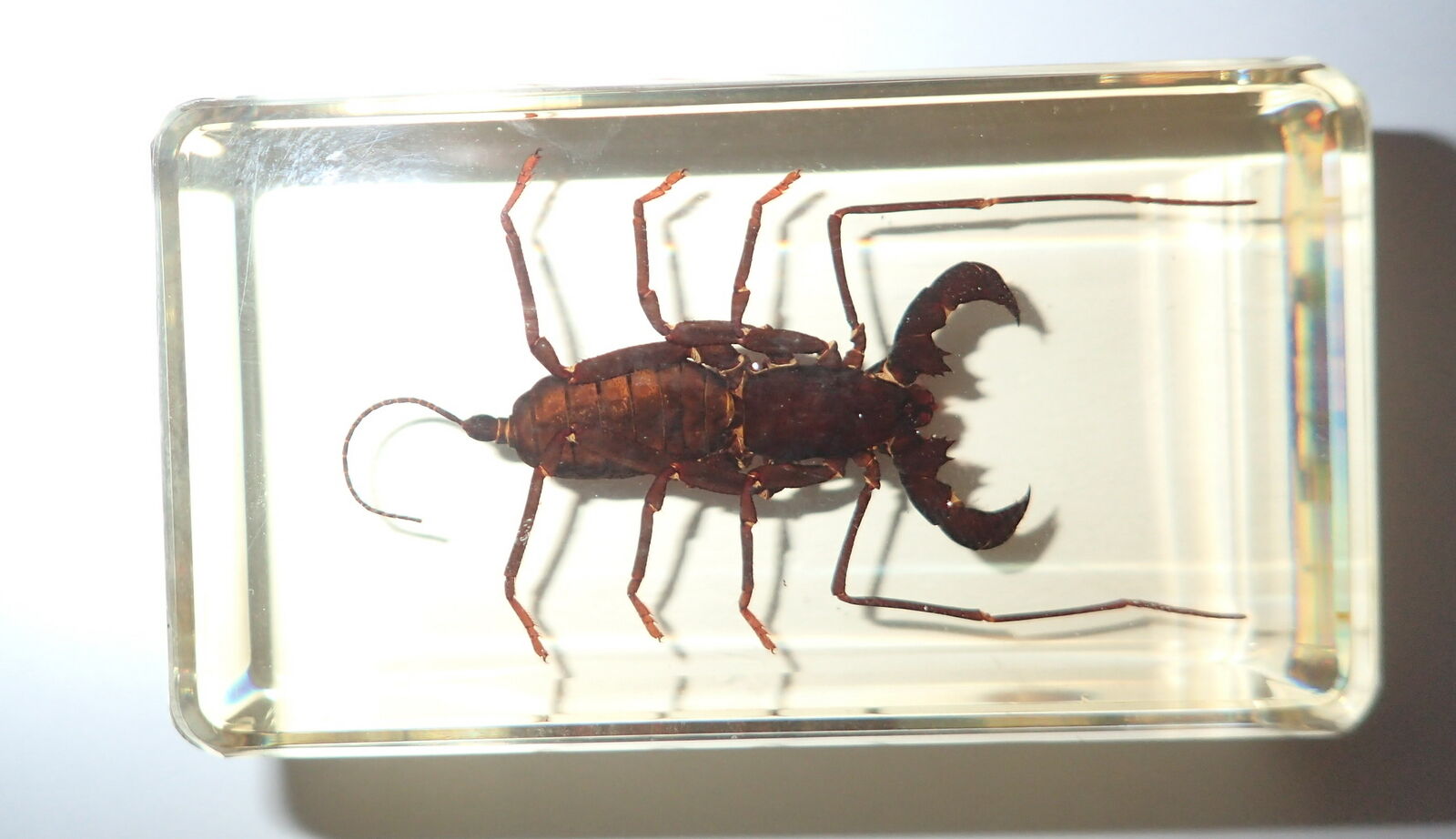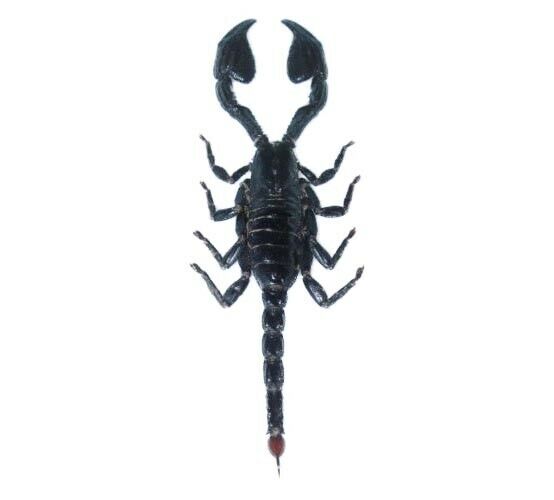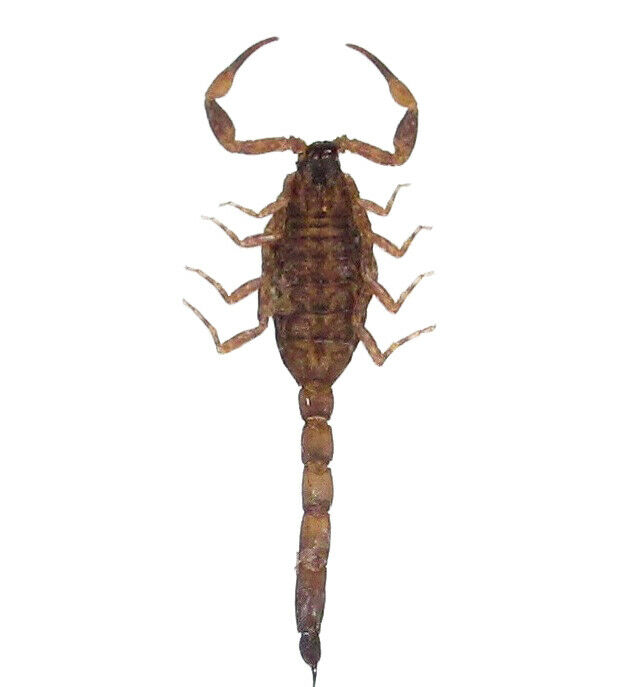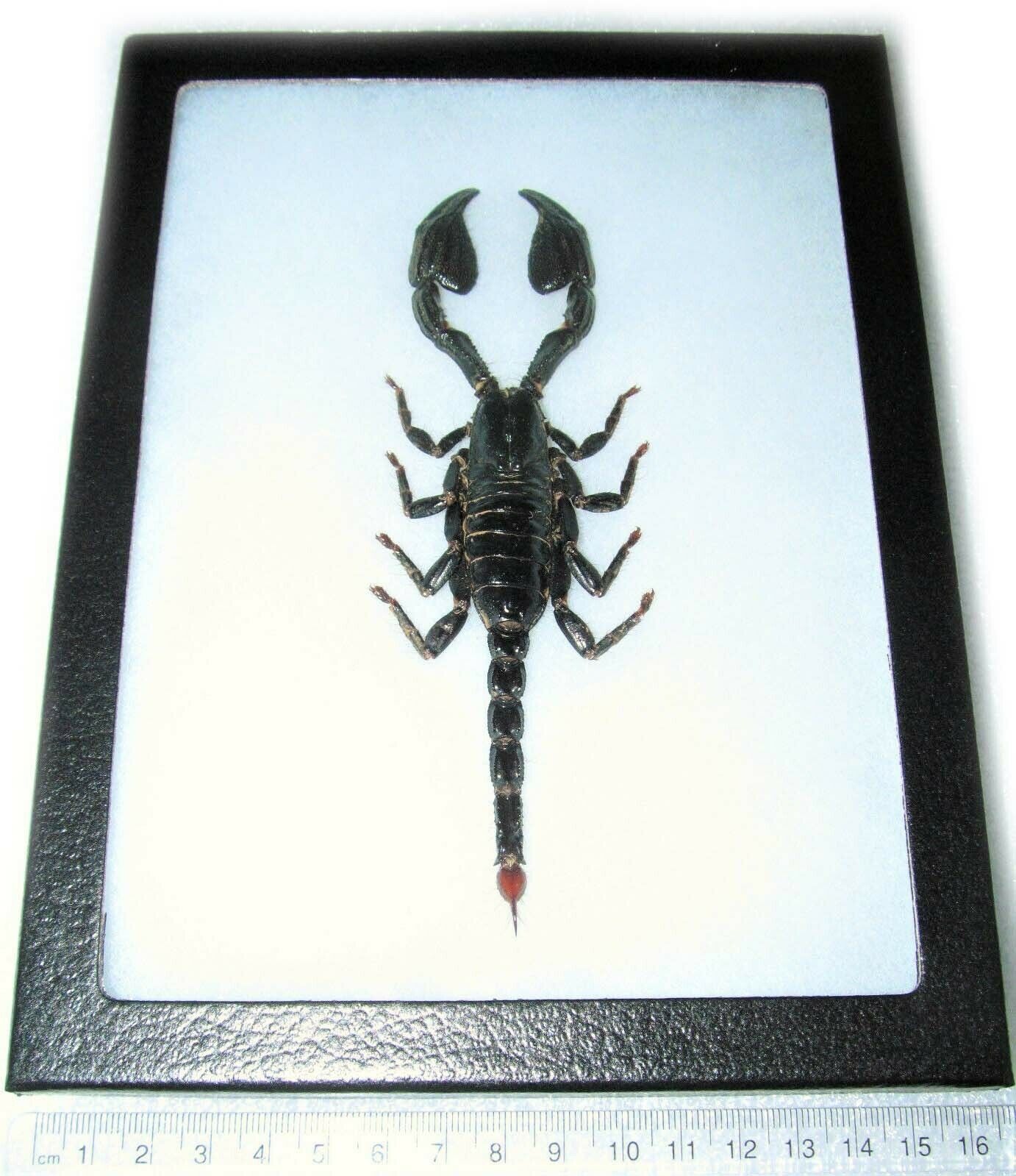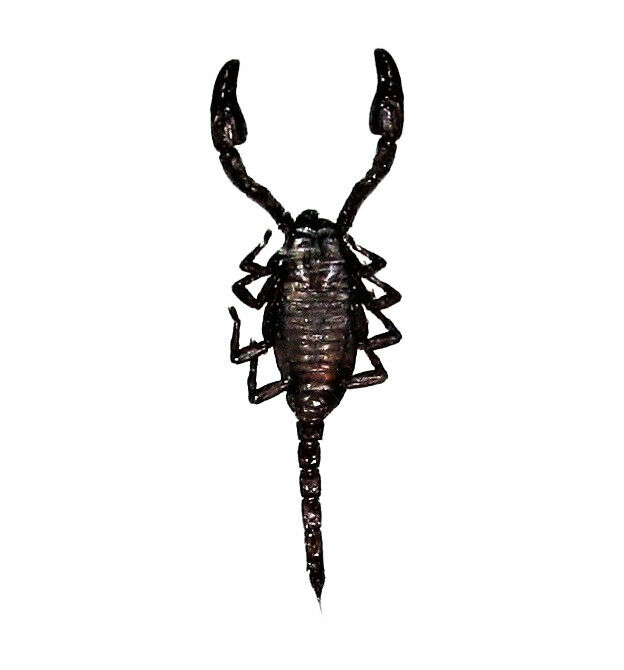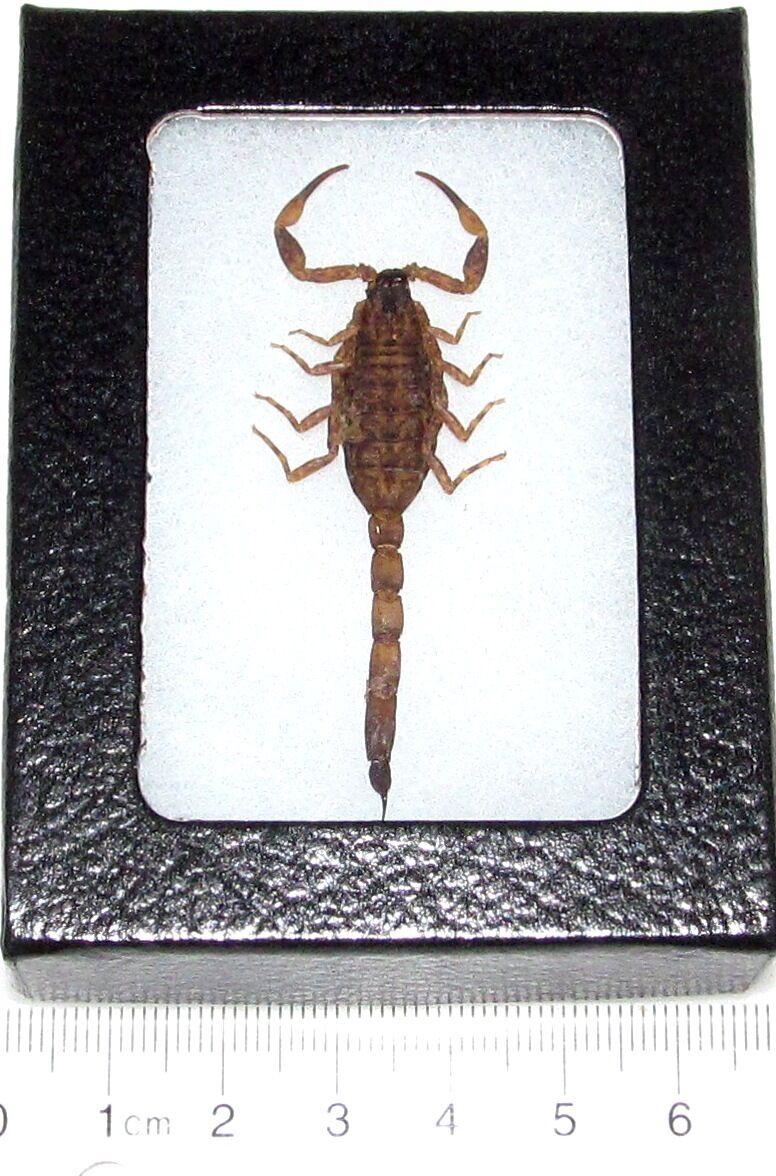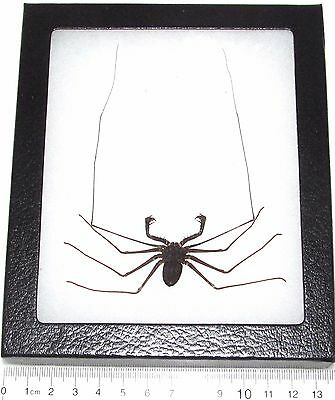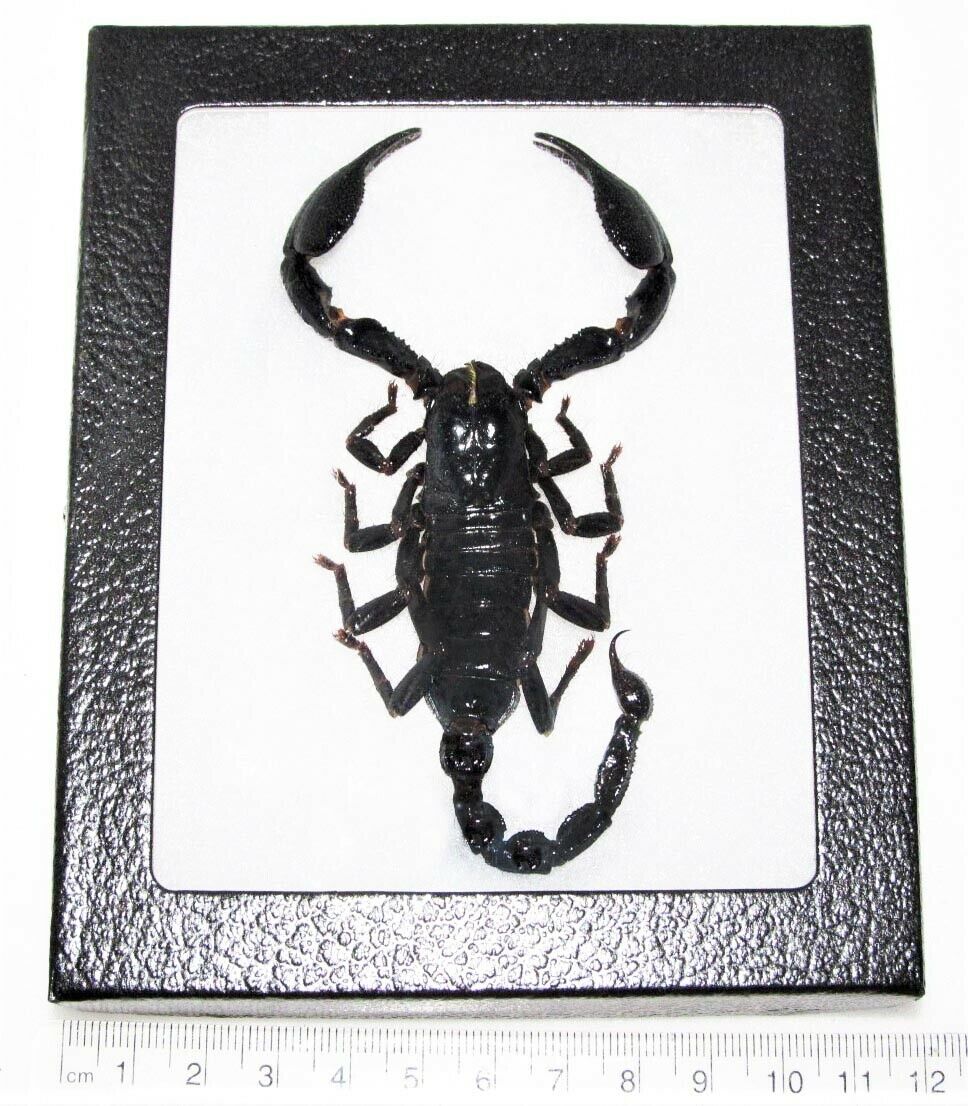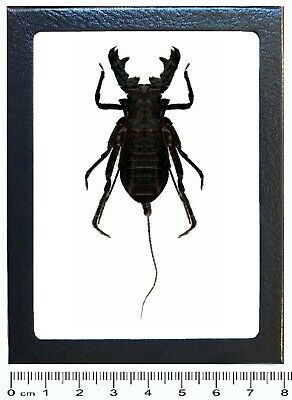-40%
Whip Scorpion in 73x40x15 mm Amber Clear Resin Block Teaching Specimen BK2A
$ 6.85
- Description
- Size Guide
Description
Real Whip Scorpion - Typopeltis crucifer specimen encased in clear lucite material. The specimen is crystal clear, indestructible and transparent. Safe, authentic and completely unbreakable product put real Scorpion right at your fingertips!Anyone can safely explore the Scorpion from every angle.
It is clear enough for microscope observation.
Length of the Scorpion from head to bottom is 3.2 cm (1.3 inch).
Size of the lucite block is 7.3x4.0x1.5 cm (2.9x1.6x0.6 inch).
Each one comes with a cardboard box for easy storage.
Weight of the lucite block is 100 g (0.22 pound) and 125 g (0.28 pound) with packing box.
Selltotheworld
From all around the world
Whip Scorpion in 73x40x15 mm Amber Clear Resin Block Teaching Specimen BK2A
Real
Whip Scorpion -
Typopeltis crucifer
specimen encased in clear lucite material. The specimen is crystal clear, indestructible and transparent. Safe, authentic and completely unbreakable product put real Scorpion right at your fingertips!
Anyone can safely explore the Scorpion from every angle.
It is clear enough for microscope observation.
Length of the Scorpion from head to bottom is 3.2 cm (1.3 inch).
Size of the lucite block is 7.3x4.0x1.5 cm (2.9x1.6x0.6 inch).
Each one comes with a cardboard box for easy storage.
Weight of the lucite block is 100 g (0.22 pound) and 125 g (0.28 pound) with packing box.
It is an ideal learning aid for students and kids and also a very good collectible item for every body.
This is a handmade real animal specimen craft. Each one will be a bit different (specimen size, color and posture) even in the same production batch.
The pictures in the listing are just for reference as we are selling multiple pieces with same pictures.
***
Whip Scorpion -
Typopeltis crucifer
This species can be found in China, Taiwan, Japan and Korea
Order:
Thelyphonida
Diversity c. 15 genera, > 100 species
Families Geralinuridae, Thelyphonidae
A
uropygid
, commonly known as a
whip scorpion
, is an invertebrate animal belonging to the former order "Uropygi" in the class Arachnida, in the subphylum Chelicerata of the phylum Arthropoda. They are also known as the
vinegarone
or
vinegaroon
because when agitated they can spray a secretion of acetic acid.
The name "uropygid" means "tail rump", referring to the whip-like flagellum on the end of the pygidium, a small plate made up of the last three segments of the abdominal exoskeleton.
Whip scorpions range from 25 to 85 mm in length, with most species not longer than 30 mm; the largest species, of the genus
Mastigoproctus
, reaching 85 mm.
Like the related orders
Schizomida
,
Amblypygi
, and
Solifugae
, the uropygids use only six legs for walking, having modified their first two legs to serve as antennae-like sensory organs. Many species also have very large scorpion-like pedipalps (pincers). They have one pair of eyes at the front of the cephalothorax and three on each side of the head, a pattern also found in scorpions Whip scorpions have no poison glands, but they do have glands near the rear of their abdomen that can spray a combination of acetic acid and octanoic acid when they are bothered. The acetic acid gives this spray a vinegar-like smell, giving rise to the common name
vinegaroon
. Other species spray formic acid or chlorine.
Whip scorpions are carnivorous, nocturnal hunters feeding mostly on insects and millipedes, but sometimes on worms and slugs.
Mastigoproctus
sometimes preys on small vertebrates. The prey is crushed between special teeth on the inside of the trochanters (the second segment of the leg) of the front legs. They are valuable in controlling the population of roaches and crickets.
Males secrete a sperm sac, which is transferred to the female. Up to 35 eggs are laid in a burrow, within a mucous membrane that preserves moisture. Mothers stay with the eggs and do not eat. The white young that hatch from the eggs climb onto their mother's back and attach themselves there with special suckers. After the first molt they look like miniature whip scorpions, and leave the burrow; the mother dies soon after. The young grow slowly, going through three molts in about three years before reaching adulthood. They live for up to another four years.
Uropygids are found in tropical and subtropical areas worldwide. They are missing in Europe, Australia, and, except for an introduced species, in Africa. They usually dig underground burrows with their pedipalps, to which they transport their prey. They may also burrow under logs, rotting wood, rocks, and other natural debris. They enjoy humid, dark places and avoid the light.
The whip scorpions have a life pattern similar to the true scorpions, but they do not possess a poisonous sting. Their flat body enables them to squeeze into extremely narrow cracks and crevices, where they prey on small arthropods and worms. A few of the larger species also attack small vertebrates, especially frogs. The palps are developed into strong pincers equipped with sharp teeth and spines, which are used for catching and crushing prey. The first pair of legs are generally much longer and thinner than the other three pairs, and may have more a tactile function rather than walking.
Item Specifics
Country/Region of Manufacture :
China
Material :
Resin
Type :
Collector Plate
Handmade :
Yes
Modified Item :
No
Animal Class :
Scorpion
Payment
By Paypal
Shipping
Free shipping cost.
We send the goods to USA, Canada, UK, Australia, New Zealand, EU countries and some other European and Asian countries by E-express, a kind of fast postal service by Hong Kong Post. It usually takes about 6 to 10 working days for delivery.
We send the goods to other countries by registered airmail and will take about 8 to 14 working days for delivery.
Returns
Returns: We accept returns with any reason in 30 days.
Contact Us
We will answer buyer messages within 24 hours during working days.
Selltotheworld
From all around the world
DESCRIPTION
PAYMENT
SHIPPING
RETURN POLICY
CONTACT US
Whip Scorpion in 73x40x15 mm Amber Clear Resin Block Teaching Specimen BK2A
Real
Whip Scorpion -
Typopeltis crucifer
specimen encased in clear lucite material. The specimen is crystal clear, indestructible and transparent. Safe, authentic and completely unbreakable product put real Scorpion right at your fingertips!
Anyone can safely explore the Scorpion from every angle.
It is clear enough for microscope observation.
Length of the Scorpion from head to bottom is 3.2 cm (1.3 inch).
Size of the lucite block is 7.3x4.0x1.5 cm (2.9x1.6x0.6 inch).
Each one comes with a cardboard box for easy storage.
Weight of the lucite block is 100 g (0.22 pound) and 125 g (0.28 pound) with packing box.
It is an ideal learning aid for students and kids and also a very good collectible item for every body.
This is a handmade real animal specimen craft. Each one will be a bit different (specimen size, color and posture) even in the same production batch.
The pictures in the listing are just for reference as we are selling multiple pieces with same pictures.
***
Whip Scorpion -
Typopeltis crucifer
This species can be found in China, Taiwan, Japan and Korea
Order:
Thelyphonida
Diversity c. 15 genera, > 100 species
Families Geralinuridae, Thelyphonidae
A
uropygid
, commonly known as a
whip scorpion
, is an invertebrate animal belonging to the former order "Uropygi" in the class Arachnida, in the subphylum Chelicerata of the phylum Arthropoda. They are also known as the
vinegarone
or
vinegaroon
because when agitated they can spray a secretion of acetic acid.
The name "uropygid" means "tail rump", referring to the whip-like flagellum on the end of the pygidium, a small plate made up of the last three segments of the abdominal exoskeleton.
Whip scorpions range from 25 to 85 mm in length, with most species not longer than 30 mm; the largest species, of the genus
Mastigoproctus
, reaching 85 mm.
Like the related orders
Schizomida
,
Amblypygi
, and
Solifugae
, the uropygids use only six legs for walking, having modified their first two legs to serve as antennae-like sensory organs. Many species also have very large scorpion-like pedipalps (pincers). They have one pair of eyes at the front of the cephalothorax and three on each side of the head, a pattern also found in scorpions Whip scorpions have no poison glands, but they do have glands near the rear of their abdomen that can spray a combination of acetic acid and octanoic acid when they are bothered. The acetic acid gives this spray a vinegar-like smell, giving rise to the common name
vinegaroon
. Other species spray formic acid or chlorine.
Whip scorpions are carnivorous, nocturnal hunters feeding mostly on insects and millipedes, but sometimes on worms and slugs.
Mastigoproctus
sometimes preys on small vertebrates. The prey is crushed between special teeth on the inside of the trochanters (the second segment of the leg) of the front legs. They are valuable in controlling the population of roaches and crickets.
Males secrete a sperm sac, which is transferred to the female. Up to 35 eggs are laid in a burrow, within a mucous membrane that preserves moisture. Mothers stay with the eggs and do not eat. The white young that hatch from the eggs climb onto their mother's back and attach themselves there with special suckers. After the first molt they look like miniature whip scorpions, and leave the burrow; the mother dies soon after. The young grow slowly, going through three molts in about three years before reaching adulthood. They live for up to another four years.
Uropygids are found in tropical and subtropical areas worldwide. They are missing in Europe, Australia, and, except for an introduced species, in Africa. They usually dig underground burrows with their pedipalps, to which they transport their prey. They may also burrow under logs, rotting wood, rocks, and other natural debris. They enjoy humid, dark places and avoid the light.
The whip scorpions have a life pattern similar to the true scorpions, but they do not possess a poisonous sting. Their flat body enables them to squeeze into extremely narrow cracks and crevices, where they prey on small arthropods and worms. A few of the larger species also attack small vertebrates, especially frogs. The palps are developed into strong pincers equipped with sharp teeth and spines, which are used for catching and crushing prey. The first pair of legs are generally much longer and thinner than the other three pairs, and may have more a tactile function rather than walking.
Item Specifics
Country/Region of Manufacture :
China
Material :
Resin
Type :
Collector Plate
Handmade :
Yes
Modified Item :
No
Animal Class :
Scorpion
Payment
By Paypal
Shipping
Free shipping cost.
We send the goods to USA, Canada, UK, Australia, New Zealand, EU countries and some other European and Asian countries by E-express, a kind of fast postal service by Hong Kong Post. It usually takes about 6 to 10 working days for delivery.
We send the goods to other countries by registered airmail and will take about 8 to 14 working days for delivery.
Returns
Returns: We accept returns with any reason in 30 days.
Contact Us
We will answer buyer messages within 24 hours during working days.
All right reserved.
Shop Category
Store Home
Fossils
◈ Insects
◈ Plants
◈ Trilobite
◈ Sea animals
Tektite
◈ Loose lots
◈ Single stone
◈ Silver wired pendant
◈ Tiktite hanger
Lapis Lazuli
▷ Polished stones
♢ Loose lots
♢ Single stones
▷ Rough stones
♢ Loose lots
♢ Single stone
◈ Craft items
Turquoise
◈ Natural turquoise
◈ Turquoise substitutes
Stone carving
Rough Stone & mineral
◈ Single piece
◈ Loose lots
Polished Stone & mineral
◈ Single piece
◈ Loose lots
Rough ruby & sapphire
◈ Ruby
◈ Sapphire
Star Ruby & Sapphire
◈ Star Ruby - Opaque
◈ Star Ruby - Transparent
◈ Blue Star Sapphire
◈ Star Sapphire - other colors
Animal specimen items
◈ Life cycle
◈ Collection set
◈ Key ring
◈ Bracelet or bangle
◈ Necklace or pendant
◈ Magnet
◈ Ring
◈ Hanger
◈ Cabochon
◈ Sphere, ball
◈ Laminated specimen
◈ Computer mouse
◈ Stapler
◈ Pen
◈ Bottle Opener
◈ Dome paperweight
◈ Earring
◈ Skeleton
◈ Fish
▷ Single specimens
♢ Spider
♢ Scorpion
♢ Beetle
♢ Marine animal
♢ Bug
♢ Bee, wasp, hornet
♢ Other insects
♢ Bat
♢ Other animal
▷ Butterfly
♢ Butterfly paperweight
♢ Laminated butterfly
Plant specimen
◈ Flower
◈ Leaf
◈ Life Cycle
◈ Collection Set
◈ Laminated items
◈ Seed or root
Stone, mineral, fossil box set
Jewelry crafts
Paper cuts
◈ Small set
◈ Large set
Other
Hot Item
10 Mohs Scale Stone Set clear plastic box Learning Real Specimen Kit
USD 18.00
Spotted Lanternfly Cicada Life Cycle Simplified Set Real Specimen Learning Aid
USD 15.00
Common Octopus Specimen 73x40x20 mm Block Real Animal Education Aid
USD 16.00
Black Indochinite Tektite Stone 10 pieces Plastic Box Set Natural Specimen Kit
USD 16.00
Insect Cabochon Golden Scorpion Oval 18x25 mm on black bottom 5 pieces Lot
USD 17.00
Picture
New List Item
Insect Lucite Key Ring Camellia Shield Bug Specimen YK10 Glow in the Dark
USD 10.99
5 Seashell Set B in 75x75x10 mm Clear Square Slide Education Specimen
USD 12.99
Common Quail Feather Specimen in 75x75x10 mm Amber Clear Square Education Slide
USD 11.99
Large Red Headed Centipede in Amber Clear Block Education Insect Specimen
USD 14.99
Domestic Goose Feather Specimen 75x75x10 mm Amber Clear Square Education Slide
USD 11.99
Custom Item
